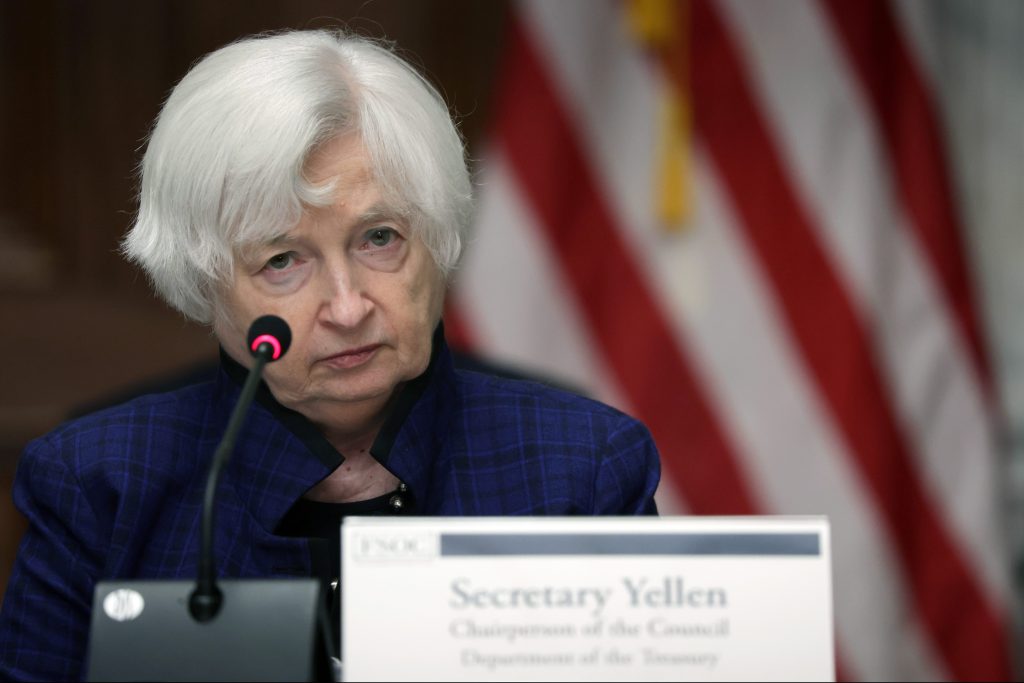US Treasury Secretary Janet Yellen has announced new sanctions on leaders of a Mexican drug cartel involved in trafficking fentanyl and its pre-cursor chemicals into the US as part of a broader push to try to stem the flow of the deadly synthetic opioid.
Yellen detailed the sanctions against eight leaders of the La Nueva Familia Michoacana cartel during a trip to Georgia alongside the US Drug Enforcement Administration and the US Attorney’s Office.
Besides sanctioning the eight targets, the Treasury’s Financial Crimes Enforcement Network (FinCEN) issued a new advisory for financial institutions to help them detect financial flows that fuel the illicit fentanyl supply chain – something Yellin said was critical to enabling law enforcement and sanctions actions against fentanyl traffickers.
These sanctions cut the targets off from the dollar-based financial system and freeze any assets that they may have in the US or in US-based institutions.
Why the US Treasury has acted now
Yellen said that President Biden has directed the entire US government to use every tool at its disposal to combat the opioid epidemic and save lives as a priority of the President’s Unity Agenda.
She noted that since 2000, more than one million people in the US have died of drug overdoses and that, besides the heartbreaking personal cost, it’s also a loss for the economy. The US Joint Economic Committee estimates that the opioid epidemic costs the American economy nearly $1.5 trillion in 2020.
It provides guidance to help financial institutions identify and report suspicious transactions related to the procurement of precursor chemicals and manufacturing equipment used to manufacture fentanyl.
US law enforcement has seized more fentanyl at ports of entry in the past two years than in the previous five years combined. This reflects not only the huge demand and underground industry operating here, but also the better detection technology the US government has implemented, Yellen said.
Reporting transactions
Reporting of such transactions will help FinCEN and partner agencies track down traffickers, she went on, calling it an “important step” in the fight against fentanyl and other synthetic opioids.
“This allows us to follow the money behind the illicit fentanyl supply chain and go after the criminals perpetrating and profiting off of the opioid epidemic,” Yellen said.
The advisory Yellen announced last week is another important step, she said, as it provides information and guidance to help financial institutions identify and report suspicious transactions related to the procurement of precursor chemicals and manufacturing equipment used to manufacture illicit fentanyl and other synthetic opioids.
The new advisory fits into a larger sanctions regime: Under the bipartisan Corporate Transparency Act, the US now requires many companies to report basic information about who owns or controls them, which is information that can then be used to combat illicit finance.
The US Treasury is also partnering with financial institutions to support their crucial role in flagging potentially illegal activity.
Last month, FinCEN, in partnership with IRS Criminal Investigation, began a new series of public-private information-sharing exchanges that bring together law enforcement and regional and local banks to share information on tracking illicit financial flows, including indicators of fentanyl-related activity.
“We plan to reach 10 cities across the United States by the end of the year,” Yellen said.
Targeted leaders
Two of the sanctions targets, Rodolfo Maldonado Bustos and Euchlides Chamacho Goicochea, were separately charged by a federal grand jury with crimes related to heroin trafficking, as the US Department of Justice office in Atlanta announced this week. Both men are fugitives believed to be residing in Mexico, it said.
The Treasury Department’s announcement noted that Bustos, aka “Don Jose,” is next in line to the co-leaders of La Nueva Familia Michoacana, while Goicochea works closely with Bustos to distribute drugs in Atlanta and Houston, among other areas.
These men and their associates are among those that have rapidly pushed into the increasingly lucrative migrant smuggling industry amid a sizable uptick of migration to the United States.
“The leaders we’re targeting have carried out heinous acts, from controlling drug routes, to arms trafficking, to money laundering, to murder. Two of those designated have been indicted by courts here in Georgia, including on charges of heroin conspiracy and money laundering,” Yellen said. “Our sanctions will cut off the cartel leaders from their ill-gotten money and make it harder for them to bring deadly fentanyl to our streets.”
















